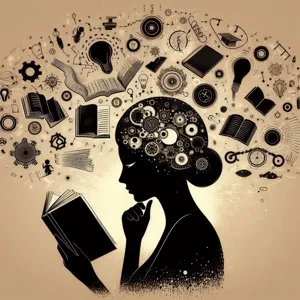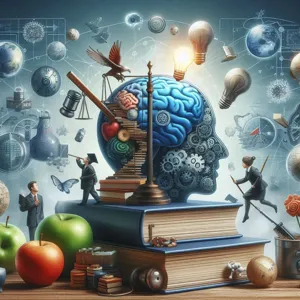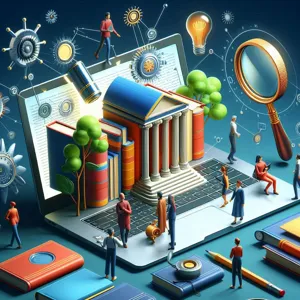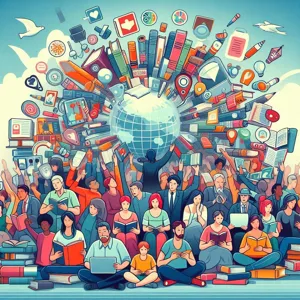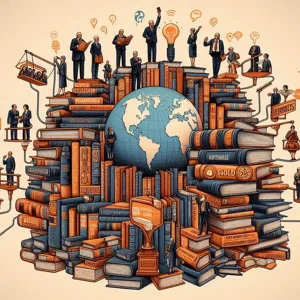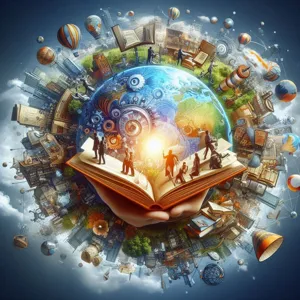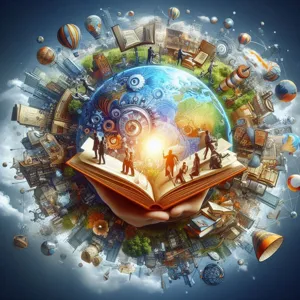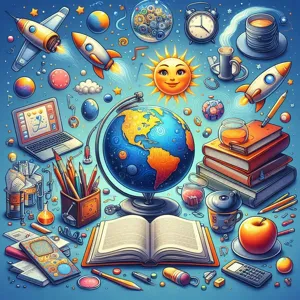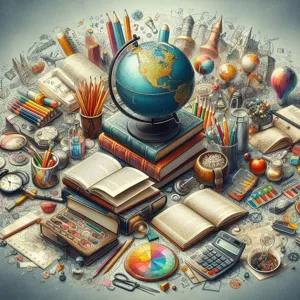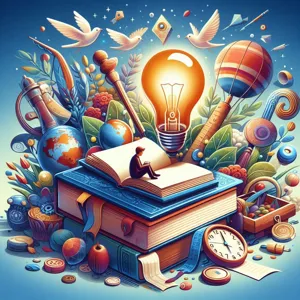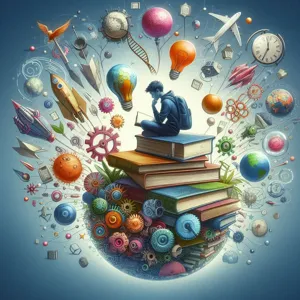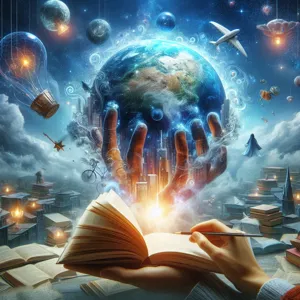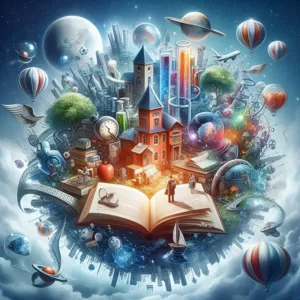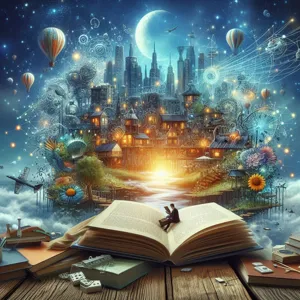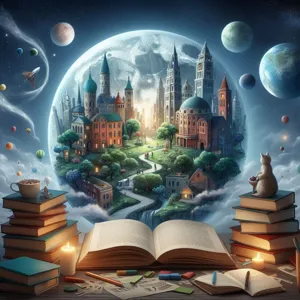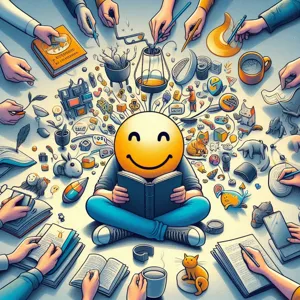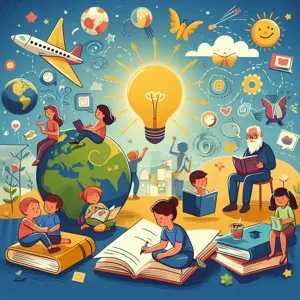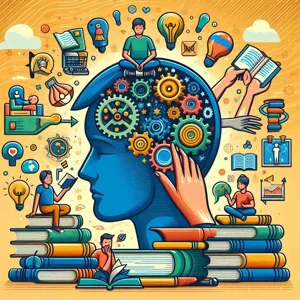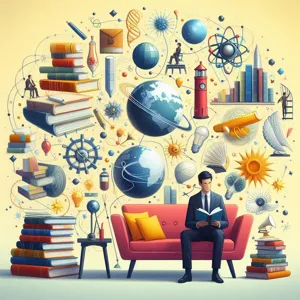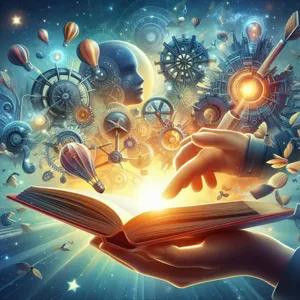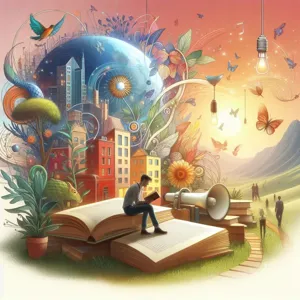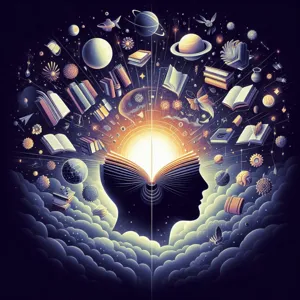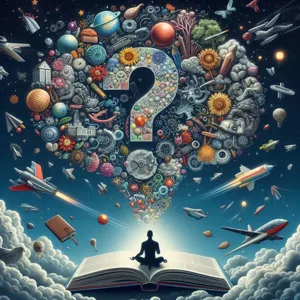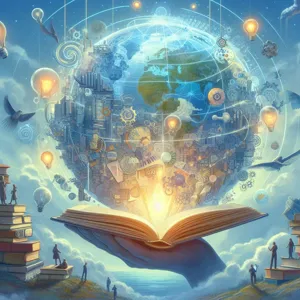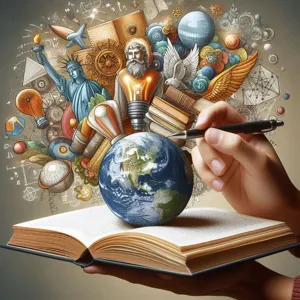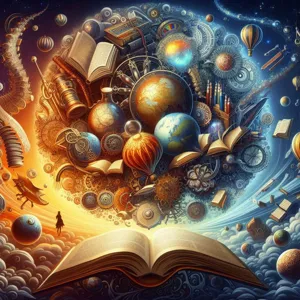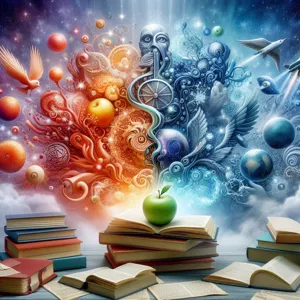For those of us who carry an insatiable wanderlust in our hearts, the world is a tapestry woven with stories waiting to be unraveled.
While the thrill of travel often beckons us to distant shores, sometimes the most transformative journeys occur within the pages of a book. In “Wanderlust in Words,” we delve into an enchanting collection of literature that transcends mere storytelling, inviting readers to traverse the globe without ever leaving their cozy reading nooks. From breathtaking landscapes to vibrant cultures and spirited adventures, these carefully curated titles are sure to ignite your adventurous spirit and inspire your next escapade. Whether you’re a seasoned globetrotter or a daydreamer longing for distant horizons, join us as we explore the literary gems that will not only feed your wanderlust but also enrich your soul with tales of exploration, self-discovery, and the boundless beauty of our world.
1. Introduction: The Power of Travel Literature

In an age where wanderlust often collides with the practicality of our daily lives, travel literature has emerged as a beacon for those yearning to escape the confines of their routines. The power of travel literature lies not just in its ability to transport readers to distant lands, but also in its capacity to evoke visceral emotions, spark curiosity, and inspire adventures of the mind and body. Each page serves as a gateway, inviting readers to embark on journeys that might be impossible in their current circumstances.
Imagine curling up in a cozy nook, a cup of tea steaming beside you, as you delve into the vibrant landscapes of a distant country through the eyes of a skilled storyteller. Whether it’s the bustling markets of Marrakech, the serene fjords of Norway, or the sun-kissed beaches of Bali, travel narratives pull you into their world with rich descriptions and captivating anecdotes. They awaken the senses, painting vivid pictures with words that dance across your imagination, wrapping you in the sights, sounds, and scents of faraway places.
Moreover, travel literature often weaves in the threads of personal transformation, reflecting the profound impact that exploration can have on the human spirit. From tales of self-discovery in the mountains of Nepal to the camaraderie forged in the bustling streets of Tokyo, these stories remind us that travel is not merely about the destinations we reach, but also about the experiences that shape who we are. They encourage us to embrace the unknown, to step out of our comfort zones, and to find beauty in the journey itself.
As we embark on this exploration of travel literature, we invite you to rediscover the joy of reading as a means of adventure. Whether you are an armchair traveler dreaming of your next destination or a seasoned explorer seeking inspiration for your next trip, the following selections promise to ignite your adventurous spirit and fuel your desire to roam. Grab your passport—figuratively, of course—and let the pages take you on a journey like no other.
2. Defining Wanderlust: What It Means to the Adventurous Reader
Wanderlust, a term that evokes a deep yearning for exploration and adventure, goes beyond just a desire to travel; it embodies a restless spirit that seeks new experiences, cultures, and landscapes. For the adventurous reader, wanderlust is a powerful motivator that shapes their literary choices and fuels their imagination. It’s the thrill of losing oneself in the vivid descriptions of far-off lands, the scent of exotic spices wafting through the pages, and the allure of the unknown beckoning from every chapter.
To the adventurous reader, wanderlust transforms the act of reading into a journey of its own. Each book becomes a passport to uncharted territories, allowing them to traverse the bustling streets of Marrakech, climb the peaks of the Himalayas, or sail the azure waters of the Caribbean—all without leaving the comfort of their favorite reading nook. These narratives not only transport readers physically but also challenge them emotionally and intellectually, encouraging a deeper understanding of the world and its diverse cultures.
Moreover, wanderlust nurtures a sense of curiosity and openness to new ideas. When readers immerse themselves in stories filled with adventure, they are often inspired to explore their own surroundings or embark on their own journeys. The pages of a well-crafted travelogue or a gripping novel can spark the imagination, urging readers to step out of their comfort zones, embrace spontaneity, and seek the thrill of the unexpected. Ultimately, defining wanderlust is about recognizing the power of literature to ignite the adventurous spirit within us all, inviting each reader to embark on a quest not just across the globe, but within their own hearts and minds.
3. Classic Travel Narratives That Inspire Exploration
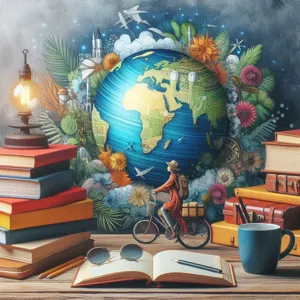
Travel narratives have a unique power to transport us to distant lands and ignite our sense of adventure. Classic works in this genre weave vivid tales that not only recount journeys but also capture the essence of exploration and the human spirit. They serve as a reminder that the world is vast and brimming with stories waiting to be discovered.
One such timeless narrative is **”The Travels” by Marco Polo**, where the famed Venetian adventurer recounts his epic journey along the Silk Road to the court of Kublai Khan. Polo’s detailed observations of cultures, customs, and landscapes offer readers a window into a world that was, at the time, largely unknown to the West. His accounts of stunning cities, exotic spices, and vibrant marketplaces stir a longing to embark on our own quests for discovery.
Another masterpiece is **”A Walk in the Woods” by Bill Bryson**, a humorous yet poignant exploration of the Appalachian Trail. Bryson’s witty reflections on nature, coupled with his encounters with fellow hikers and his candid musings about the wilderness, not only entertain but also inspire readers to lace up their hiking boots and embrace the great outdoors. His narrative illustrates that the journey is just as important as the destination, and sometimes, the best adventures are the ones that challenge our limits.
**”In Patagonia” by Bruce Chatwin** is another classic that captures the imagination. Chatwin’s journey through the windswept landscapes of Patagonia is infused with stories of the region’s unique inhabitants and its rich history. His lyrical prose transports readers to this remote corner of the world, inviting them to ponder what it means to wander and the connections we make along the way.
These classic travel narratives encompass the thrill of exploration, the beauty of diverse cultures, and the transformative power of travel. They remind us that every page turned is an opportunity to dream, to yearn for adventure, and to ultimately set out on our own paths of discovery. So, grab one of these timeless books, let your imagination soar, and allow your adventurous spirit to guide you to new horizons.
4. Contemporary Novels with Adventurous Themes
In the vast landscape of contemporary literature, a treasure trove of novels beckons to the adventurous spirit within us all. These stories not only whisk readers away to far-off lands but also delve into the complexities of the human experience, exploring themes of self-discovery, resilience, and the pursuit of dreams.
One such gem is **“The Alchemist” by Paulo Coelho**, a modern classic that follows the journey of Santiago, a young shepherd who yearns to find his personal legend. As he traverses the deserts of North Africa in search of treasure, readers are invited to reflect on their own paths and the importance of following one’s dreams, no matter the obstacles that may arise. Coelho’s poetic prose and profound insights make this novel a compelling companion for anyone yearning for adventure.
Another contemporary masterpiece is **“Wild” by Cheryl Strayed**. This memoir recounts Strayed’s transformative hike along the Pacific Crest Trail after experiencing personal tragedy and turmoil. Her journey is both physical and emotional, filled with moments of struggle, triumph, and profound connection to nature. Strayed’s raw and honest storytelling invites readers to embrace the wilderness, both external and internal, inspiring them to confront their own challenges and seek healing through adventure.
For those who prefer fiction, **“The Night Circus” by Erin Morgenstern** offers a fantastical escape into a world of magic and mystery. Set in a traveling circus that only opens at night, the story weaves together themes of rivalry, love, and the extraordinary. As the characters navigate the enchanting yet perilous landscape of their lives, readers are transported to a realm where the boundaries of reality blur, igniting the imagination and stirring the desire for exploration.
Finally, **“The Art of Racing in the Rain” by Garth Stein** provides a unique perspective on adventure through the eyes of Enzo, a dog with a human soul. Set against the backdrop of a race car driver’s struggles and triumphs, this poignant tale explores themes of loyalty, love, and perseverance. As Enzo accompanies his owner on a journey filled with highs and lows, readers are reminded that adventure can be found in the everyday moments of life.
These contemporary novels, with their adventurous themes and richly woven narratives, not only ignite our wanderlust but also encourage us to embark on our own journeys—whether they be physical, emotional, or spiritual. So grab a book, settle into your favorite reading nook, and allow the pages to transport you to uncharted territories that will awaken your adventurous spirit.
5. Memoirs of Adventure: Real-Life Journeys That Captivate
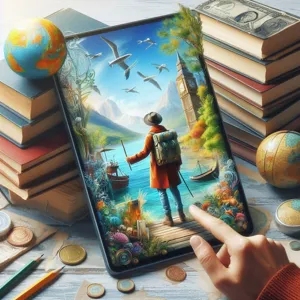
Memoirs of adventure have a unique way of transporting readers to distant lands, immersing them in the sights, sounds, and sensations of real-life journeys. These narratives, penned by intrepid explorers, seasoned travelers, and everyday adventurers, offer an authentic glimpse into the highs and lows of their escapades, igniting a sense of wanderlust that stirs in our hearts.
Take, for example, Cheryl Strayed’s “Wild,” where she shares her transformative journey along the Pacific Crest Trail. With every page, readers feel the weight of her backpack, the sting of her blisters, and the freedom of the wild landscapes that challenge her both physically and emotionally. Strayed’s candid reflections on loss and self-discovery serve as a powerful reminder that adventure is not just about the destination; it’s about the personal growth that occurs along the way.
Similarly, Pico Iyer’s “The Art of Stillness” invites readers to experience the beauty of pausing in our fast-paced world. Iyer’s travels—from the bustling streets of Tokyo to the serene landscapes of India—reveal that adventure doesn’t always mean moving forward; sometimes, it’s about finding stillness within ourselves. His eloquent prose resonates with anyone yearning for deeper connections, whether with nature, culture, or the self.
These memoirs, and many others, serve as both an invitation and an inspiration. They challenge us to step outside our comfort zones, explore the unknown, and embrace the rich tapestry of life experiences awaiting us. As you dive into these captivating tales, prepare to be whisked away on journeys that not only spark your adventurous spirit but also encourage you to pen your own story of exploration, discovery, and resilience.
6. Travel Guides That Read Like Novels
Travel guides don’t have to be dry, factual tomes filled with endless lists of dos and don’ts. In fact, some of the most captivating travel guides are those that read like novels, weaving together rich narratives, personal anecdotes, and vibrant descriptions that transport you to the heart of a destination long before you even arrive. These guides blend the art of storytelling with practical travel advice, allowing you to immerse yourself in the culture, history, and atmosphere of a place before you set foot there.
Imagine flipping through the pages of a guide that paints a picture of bustling markets in Marrakech, where the scent of spices mingles with the sound of haggling voices, or a guide that takes you on a winding journey through the lavender fields of Provence, capturing the essence of the sun-soaked landscape and the charm of quaint villages. These are not just books that tell you where to stay or what to eat; they invite you to explore the soul of a place, igniting your imagination and wanderlust.
Authors like Pico Iyer and Bill Bryson have mastered this art, taking readers on journeys that are as much about the experience of travel as the destinations themselves. Their words evoke emotion and a sense of curiosity, compelling you to pack your bags and embark on your own adventure. Whether you’re planning a grand expedition or simply dreaming of far-off lands while curled up in your favorite reading nook, these travel guides serve as both inspiration and a source of knowledge, ensuring that when you do travel, you do so with a deeper understanding and appreciation of the world around you.
So, if you’re yearning for adventure but can’t quite get away just yet, pick up one of these travel guides that read like novels. Let the stories unfold and allow your adventurous spirit to be ignited through the pages, as you glean insights, tips, and inspiration for your next journey. You may find that the best travel experience begins long before you board a plane; it starts with the stories you read.
7. Poetry That Evokes the Spirit of Wanderlust
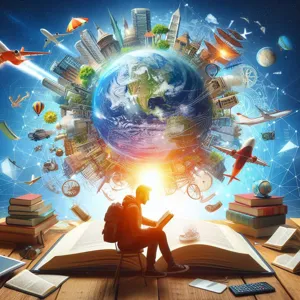
Poetry has an incredible ability to transport us to distant lands, evoke feelings of freedom, and awaken our inner explorers. In a world where the hustle and bustle often dulls our adventurous spirit, a carefully chosen collection of poems can serve as a passport to adventure, igniting our wanderlust with each line.
Imagine settling into a cozy nook, a warm beverage in hand, as the rhythmic cadence of verses sweeps you away to sun-drenched beaches, misty mountain tops, and bustling city streets. Poems that evoke the spirit of wanderlust often paint vivid imagery, capturing the essence of travel not just as a physical journey, but as a transformative experience. The words can leap from the page, shimmering like the sun on the ocean, or whisper like a gentle breeze rustling through leaves.
Consider the works of poets like Mary Oliver, whose keen observation of nature invites readers to explore the wild, or Pablo Neruda, whose passionate verses celebrate love and adventure in equal measure. Their words encourage us to embrace the unknown, to seek out new horizons, and to find beauty in every corner of the world.
Moreover, poetry invites us to reflect on our own travel experiences, sparking memories of laughter shared over campfires, the thrill of discovery in unfamiliar streets, and the profound connections we forge along the way. It reminds us that the spirit of wanderlust resides not only in far-off destinations but also in the stories we carry within us.
As you delve into poetry that captures this essence, you’ll find yourself not just reading, but dreaming—planning your next getaway, yearning for the open road, and ultimately, rediscovering the adventurous spirit that lies within. So, grab a notebook, jot down your thoughts, and let the verses inspire your next journey, wherever it may lead.
8. Books Set in Breathtaking Locations Around the World
When it comes to igniting your adventurous spirit, few things can transport you to far-off lands quite like a beautifully written book set in breathtaking locations around the world. These literary gems not only tell a story but also immerse you in vibrant landscapes, rich cultures, and exhilarating experiences that awaken your wanderlust.
Imagine flipping through the pages of a novel set against the backdrop of the majestic Himalayan mountains, where the air is crisp, and the paths are lined with ancient prayer flags fluttering in the breeze. Or picture yourself strolling along the sun-kissed beaches of Bali, as a captivating narrative weaves together the lives of its colorful locals, inviting you to dive deeper into their world.
Each book serves as a passport, taking you to the bustling markets of Marrakech, where the scent of spices and the sounds of vibrant chatter fill the air, or to the serene vineyards of Tuscany, where every sip of wine tells a story of the land. These stories not only highlight the beauty of their settings but also invite you to explore the intricacies of the cultures and histories embedded within them.
From the romantic streets of Paris painted in the soft glow of twilight to the rugged landscapes of Patagonia that challenge your sense of adventure, these books create a tapestry of experiences that beckon you to pack your bags and set out on your own journey. Whether you yearn for the thrill of trekking through uncharted territories or the simple pleasure of lounging in a café overlooking a picturesque square, there’s a book out there that can inspire your next adventure.
So, grab a cozy blanket, a cup of your favorite brew, and delve into these remarkable tales. Let the words transport you to breathtaking locations, where every turn of the page ignites your sense of wanderlust and fuels your desire to explore the world beyond your doorstep.
9. The Role of Fiction in Sparking Travel Curiosity
Fiction has an enchanting ability to transport readers to distant lands, weaving intricate narratives that ignite the flames of wanderlust within us. Through the power of storytelling, authors conjure vivid landscapes, vibrant cultures, and the thrill of adventure, allowing us to embark on journeys we might not otherwise experience. A well-crafted novel can take you from the bustling streets of a Moroccan souk to the serene beaches of a remote Pacific island, all within the confines of your favorite reading nook.
Consider a book like “The Alchemist” by Paulo Coelho, where the protagonist’s quest for treasure leads him across the deserts of North Africa. As you follow Santiago’s journey, you can’t help but feel the sun-warmed sand beneath your feet, hear the whispers of the desert wind, and experience the transformative power of travel through his eyes. Such narratives not only entertain but also spark a curiosity about the places and experiences that lie beyond our immediate surroundings.
Fiction also opens the door to cultural exploration. Through the eyes of well-developed characters, readers gain insight into different customs, traditions, and ways of life. For instance, in “A Year in Provence” by Peter Mayle, readers are immersed in the charming quirks of rural French life, which might inspire a longing to sip wine at a sun-drenched café or wander through lavender fields.
Moreover, fiction often serves as a catalyst for conversations about travel. Book clubs and literary discussions can ignite a collective enthusiasm, sparking plans for group trips inspired by a shared love for a particular story. Whether it’s delving into the historical adventures of “The Book Thief” set in Germany or the romantic escapades in “Eat, Pray, Love,” these narratives foster a sense of connection that can propel us from the page to the passport.
In essence, fiction does more than entertain; it cultivates a sense of adventure, encouraging us to explore new destinations and embrace the unknown. As we turn each page, we not only discover the beauty of far-off places but also awaken our own adventurous spirits, inspiring us to seek out the extraordinary in our own lives. So, grab a book, get lost in its pages, and let it guide you to your next great adventure!
10. How to Curate Your Own Travel Reading List
Curating your own travel reading list is more than just picking up a few titles; it’s about crafting a personalized journey that fuels your wanderlust and complements your unique sense of adventure. Start by reflecting on your travel aspirations—are you drawn to the bustling streets of Tokyo, the serene landscapes of New Zealand, or the rich history of ancient Rome? Identifying the destinations that ignite your passion will help guide your selection.
Next, consider the genres that resonate with you. If you thrive on thrilling escapades, look for adventure novels that whisk you away to uncharted territories. For those who savor deep cultural experiences, seek out memoirs by travelers who recount their journeys with vivid detail and heartfelt emotion. Don’t forget about fiction that captures the essence of a place; authors often weave rich tapestries of setting and narrative that can transport you without ever leaving your armchair.
In addition to exploring different genres, diversify your list by including books from various perspectives. Look for works by local authors or those who have experienced the culture firsthand. This not only enriches your understanding but also offers a more authentic glimpse into the heart of a destination. Consider classic travel literature as well; the timeless works of Paul Theroux or Pico Iyer can inspire you with their philosophical insights and exquisite prose.
Finally, remember that your reading list should evolve as you do. Keep an open mind and continually seek out new recommendations, whether from fellow travelers, book clubs, or online forums. As you curate your travel reading list, let it reflect your dreams, desires, and the ever-changing landscape of your adventurous spirit. With each book you dive into, you’ll find yourself not only exploring new worlds but also fueling your passion for travel, one page at a time.
11. Exploring Different Cultures Through Literature
Exploring different cultures through literature opens doors to worlds that may be vastly different from our own, yet reveal the threads of humanity that connect us all. Books have a unique power to transport readers beyond geographical boundaries, allowing them to experience the vibrant tapestry of life in distant lands without ever leaving the comfort of their home.
Imagine immersing yourself in the lush landscapes of the Amazon rainforest through the vivid storytelling of a South American author, or wandering the bustling streets of Tokyo as you delve into the intricate lives of its characters in a contemporary Japanese novel. Each page can serve as a passport, inviting you to savor the flavors of traditional cuisine, understand local customs, and appreciate the nuances of diverse social dynamics.
Literature provides a lens through which we can observe and empathize with the struggles and triumphs of people from various backgrounds. Whether it’s the poignant prose of Chimamanda Ngozi Adichie that illuminates the complexities of Nigerian society, or the heartwarming tales of family and resilience found in Isabel Allende’s works set against the backdrop of Chile, each narrative enriches our understanding of different cultures.
Moreover, reading about different cultures can ignite our own sense of adventure. It inspires curiosity and motivates us to explore these places in real life, encouraging travel and a deeper appreciation for the world’s diversity. So, grab a book that piques your interest, settle into your favorite reading nook, and let the stories carry you away. You might just find that your next great adventure begins within the pages of a novel.
12. Bookstores and Libraries as Travel Destinations
In a world where travel often takes us to far-off lands, there lies a unique treasure trove of adventure waiting to be discovered right in our own neighborhoods: bookstores and libraries. These sanctuaries of literature are not just repositories of books; they are portals to new worlds, filled with stories that can transport you to exotic locales or ignite your imagination about places yet to be explored.
Imagine stepping into a cozy, independent bookstore with its wooden shelves lined with travel memoirs, vivid novels, and captivating histories. The scent of freshly brewed coffee wafts through the air as you meander through the aisles, each book beckoning you with the promise of adventure. One moment you might find yourself trekking through the Amazon rainforest with a daring explorer, and the next, you could be sipping tea in a quaint café in Paris, all without ever leaving the comfort of your chair.
Libraries, on the other hand, offer an equally enchanting experience. They are often overlooked as mere study spaces, but within their walls lies a rich collection of travel guides, cultural narratives, and global literature waiting to be explored. Browsing through the stacks can spark the kind of wanderlust that compels you to plan your next journey, whether it’s a spontaneous road trip or a meticulously planned expedition to the other side of the globe.
Many bookstores and libraries also host events, such as travel talks, author readings, and book signings, providing a communal space for fellow wanderers to share their experiences and insights. These gatherings can foster a deeper connection to the places and cultures you long to visit, making the journey feel even more tangible and real.
So, the next time you find yourself yearning for adventure, consider visiting your local bookstore or library. Dive into the pages that await you, and let the stories within ignite your adventurous spirit, transforming your reading experience into a journey of its own. After all, travel is not just about the places you go, but the stories you collect along the way.
13. Joining a Book Club for Adventure Lovers
Joining a book club for adventure lovers can be a transformative experience that not only deepens your literary journey but also connects you with fellow enthusiasts who share your passion for exploration. Imagine gathering with a group of like-minded individuals, each with a thirst for adventure, as you dive into the pages of gripping novels and captivating travel memoirs that whisk you away to far-off lands.
In these clubs, discussions often extend beyond the book itself, igniting conversations about personal travel experiences, dream destinations, and the adventures that await. You might find yourself sharing stories of hiking through the majestic Andes, sailing across the turquoise waters of the Caribbean, or wandering through the bustling streets of Tokyo, all inspired by the narratives you’ve read together.
Moreover, many adventure-focused book clubs organize themed outings that mirror the essence of the books you read. Picture embarking on a local hike inspired by a nature memoir or hosting a potluck featuring dishes from a novel set in Italy. These activities not only enhance the reading experience but also foster a sense of community, as you create lasting memories with fellow adventurers over shared meals and stories.
In a world where travel can often feel out of reach, a book club serves as a gateway to adventure, offering both inspiration and camaraderie. Whether you’re curled up with a good book at home or exploring the great outdoors with new friends, the spirit of adventure thrives within the pages of literature and within the bonds you form with your fellow book lovers. So, grab your next great read and prepare to embark on a journey that transcends the written word—because the adventure begins the moment you open the cover.
14. How to Use Literature to Plan Your Next Trip
Literature possesses a unique power to transport us to distant lands, ignite our imaginations, and inspire our wanderlust like nothing else. As you embark on the journey of planning your next adventure, consider the countless books that can guide you through both the logistics and the emotional landscapes of travel. Here’s how you can effectively harness the magic of literature to curate your next getaway.
Begin by selecting novels or travelogues that feature the destination you have in mind. The vivid descriptions and immersive storytelling within these pages allow you to visualize the sights, sounds, and scents of a new place, providing a deeper context that mere travel guides often lack. For instance, reading Paul Theroux’s “The Great Railway Bazaar” can give you a sense of the enchanting landscapes and cultures you’ll encounter on a train journey across Asia, while Bill Bryson’s “A Walk in the Woods” can inspire a hiking trip along the Appalachian Trail with humor and insight.
Next, delve into the rich history and culture of your chosen location through non-fiction works. Books on local customs, cuisine, or folklore can equip you with invaluable knowledge that enhances your travel experience. Imagine savoring a traditional dish in Italy while having read about its origins and cultural significance in a book like “The Silver Spoon.” This not only enriches your culinary experience but also fosters a deeper connection to the people and places you visit.
Consider creating a travel book club with friends or fellow adventurers where you collectively explore literature related to your upcoming trip. This shared experience can ignite discussions filled with excitement and anticipation, as well as provide a platform to exchange tips and recommendations.
Lastly, as you plan your itinerary, keep a journal or digital document to capture quotes, ideas, and inspiration from the books you read. Use these notes to craft an itinerary that resonates with the themes and stories that captivated you. Whether it’s a visit to a hidden café mentioned in a novel or a stroll through a market described in a memoir, let literature be your compass.
In this way, literature not only serves as a source of inspiration but also as a tangible tool for planning your travels. By navigating the world through the lens of words, you can transform your next trip into an adventure enriched by the stories that brought you there. So pick up a book, let your imagination wander, and prepare to venture into the unknown with the wisdom of literature as your guide.
15. Conclusion: The Lasting Impact of Books on Our Adventurous Souls
In a world brimming with distractions, books remain a steadfast companion for those yearning for adventure. The pages of a well-crafted narrative can transport us to distant lands, introduce us to vibrant cultures, and immerse us in experiences we may never encounter in our own lives. As we close the cover on each story, we carry with us not just the plot, but a piece of the journey—an indelible mark on our adventurous souls.
The impact of literature on our desire to explore is profound. A single sentence can spark a fervent wish to trek through the Amazon rainforest or to wander the cobblestone streets of a quaint European village. Authors, through their evocative prose and vivid descriptions, possess the remarkable ability to ignite our imaginations, making us believe that adventure is just a page turn away. Whether it’s the gripping tales of intrepid explorers or the quiet reflections of travel memoirists, each book serves as a gentle nudge, urging us to step outside our comfort zones and embrace the unknown.
In conclusion, the interplay between literature and adventure is a dance that enriches our lives. Books not only inspire us to dream; they empower us to take action. They remind us that the world is vast and filled with wonders waiting to be discovered. So, as you embark on your next literary journey, remember that each story you read is a call to adventure—one that can lead you to uncharted territories, both in the world around you and within yourself. Embrace the lasting impact of books, and let them guide you on your next great escapade. Happy reading and happy wandering!
As we conclude our literary journey through the pages of adventure, we hope you’ve found inspiration to fuel your wanderlust and ignite your adventurous spirit. Each book we explored offers a unique lens into distant lands, diverse cultures, and exhilarating experiences, inviting you to travel beyond your physical boundaries. Whether you’re curled up in a cozy nook or planning your next trip, these stories serve as both a passport and a guide, reminding us that adventure can be found in every nook and cranny of the world—and within ourselves. So, grab your next read, let the words transport you, and embrace the thrill of exploration, both in literature and in life. Happy reading, and may your adventures—real or imagined—be endless!

